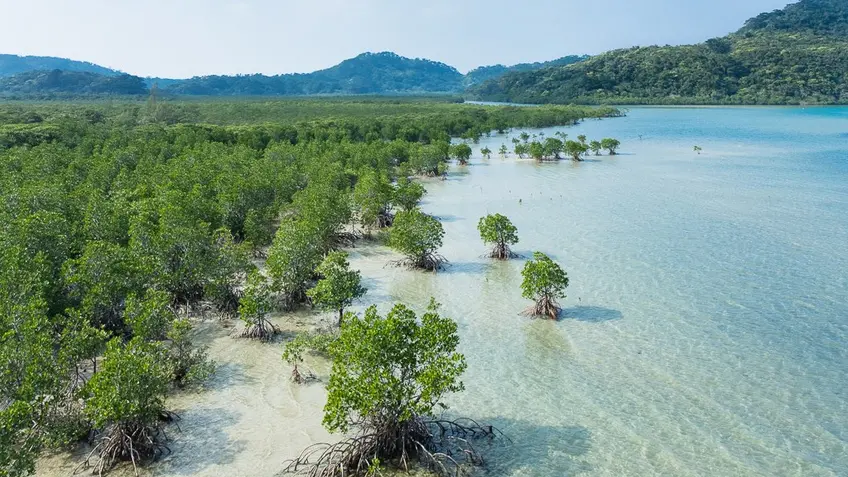Global Action to Tackle the Climate and Biodiversity Crises
"Mangrove swamp, Iriomote Island, Okinawa, Japan" by Anagounagi licensed under CC BY-SA 4.0
Countries face two interconnected crises: climate change and biodiversity loss. These two crises exacerbate one another, risking irreversible environmental impacts. Climate change drives biodiversity loss, leading to more severe floods and droughts and altering ecosystems. At the same time, ecosystem degradation releases greenhouse gases and reduces the ability of natural systems to absorb atmospheric carbon. Addressing these crises can yield significant benefits. Protecting and restoring biodiversity can enhance ecosystem resilience, improve carbon sequestration and help communities adapt to climate impacts.
Tackling these crises offers significant opportunities. Protecting and restoring biodiversity strengthens ecosystems, boosts carbon sequestration and helps communities adapt to climate impacts.
The 2015 Paris Agreement and the 2022 Kunming-Montreal Global Biodiversity Framework (GBF) provide the frame for countries to develop and implement ambitious climate action and biodiversity strategies. The first Global Stocktake (GST), the most comprehensive assessment of the global response to the climate crisis, recognizes the clear link between the climate and biodiversity crises — and the need for integrated action.
To support this linkage, the NDC Partnership collaborates with key actors working at the nexus of climate and nature. This includes:
- The three Rio Convention secretariats: UNFCCC, CBD and UNCCD
- UNFCCC, CBD and UNCCD COP presidencies
- National Biodiversity Strategy and Action Plan (NBSAP) Accelerator Partnership
Coordination among these actors through the Climate-Nature Coordination Platform (CNCP) aims to support the implementation of synergistic actions that address the climate and biodiversity crises. The CNCP stems from the COP28 Joint Statement on Climate, Nature and People. This statement brought together coalitions and initiatives committed to strengthening synergies between climate action and biodiversity conservation.
As part of our support to developing countries, the NDC Partnership recognizes that many countries reference nature, biodiversity, ecosystem services, ecosystem-based adaptation and nature-based solutions (NbS) in their Nationally Determined Contributions (NDCs) and implementation plans. Under the CNCP, the NDC Partnership surfaces country needs related to NDC enhancement and implementation with a strong biodiversity focus. Through this effort, countries can leverage the broad network of support available through the CNCP. Similarly, the NDC Partnership aims to leverage support from our coalition to support country needs identified through the other coalitions and initiatives engaged in the Platform.
The Partnership matches country needs related to climate and nature to technical assistance and project financing through our Country Engagement work. Our Global Call for NDCs 3.0 & LT-LEDS provides dedicated resources and expertise for countries to align, update and enhance NDCs 3.0, the next round of NDCs due in 2025, and Long-Term Low Emissions Development Strategies (LT-LEDS) in line with the Paris Agreement. This includes nature-related actions in both documents and aligning them with NBSAPs.
Through this collaboration, the NDC Partnership intends to increase the available support options for countries to implement their climate and biodiversity objectives, and ultimately increase their resilience, well-being and sustainable development efforts.
For more information, email supportunit@ncpartnership.org.
